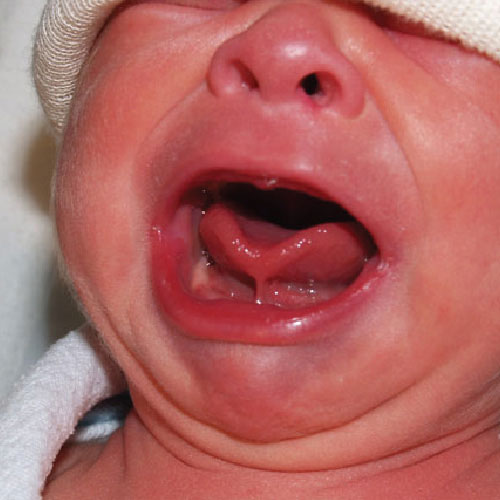What is Tongue Tie?

The 'lingual frenum' (or lingual frenulum) is the cord that stretches from under the tongue to the floor of the mouth.
'Tongue tie', 'Ankyloglossia' or 'short frenum' are the terms used when the lingual frenum is short and restricts the mobility of the tongue.Tongue tie can be defined as a structural abnormality of the lingual frenum. When the frenum is normal, it is elastic and does not interfere with the movements of the tongue in sucking, eating, clearing food off the teeth in preparation for swallowing and, of course, in speech. When it is short, thick, tight or broad it has an adverse effect on oromuscular function, feeding and speech. It can also cause problems when it extends from the margin of the tongue and across the floor of the mouth to finish at the base of the teeth.
Tongue tie is thought to happen for at least one in every ten newborns. Depending on the degree of the tongue tie, breastfeeding can be compromised as can a baby's weight and digestive system. Often, newborns with tongue tie ingest air at a higher rate as they try to cope with the flow of their mother's milk the best way they can, because of this they may labelled as having 'colic'. Supply issues can arise and blocked ducts, mastitis can occur. Breastfeeding can become painful for the mother and bubs may cry inconsolably, either from hunger or from ingested air passing through the intestines.
Symptoms of Tongue Tie
Latch characteristics that may occur – only a few of these indicators may be present
- Your baby fails to latch on to the nipple
- His latch feels shallow
- Your baby constantly slips off the breast
- It feels like baby is hanging on by the gums or chewing
- Your baby makes clicking noises when sucking
- Your baby gasps for air mid feed
- He chokes on milk or seems unable to handle rate of flow
- He makes loud gulping noises during active feeding
- He dribbles during feeds
Effects on the breast
- Nipple pain that is not improved after help with positioning and attachment
- Nipple pain that persists for several weeks
- Blisters on your nipples
- Mastitis, blocked ducts and/or incomplete emptying of the breast
- Low milk supply
- You may also have had one or more diagnoses of thrush which may or may not have appeared to clear up with medication.
Effects on the baby
- Be gaining little weight or weight loss in early days may be greater than expected although some Tongue-tied babies can actually gain weight very rapidly
- Have few dirty nappies
- Be tailing off on weight graphs i.e. Baby is gradually dropping centiles
- Be fussy or unsatisfied
- Be anxious when feeding
- Have reflux or be on meds
- Have colic
- Be taking in air during feeding so are unsettled by gas
- Have chiropractic adjustments that don't "hold"
If you feel your baby may have a tongue tie then please seek professional diagnosis.
In the meantime, this website http://www.cwgenna.com/quickhelp.html may help you to define more clearly if this is an issue for your baby.
Read Anne's experience of Tongue Tie
References: http://www.tonguetie.net, http://www.tonguetiehelp.org.uk


